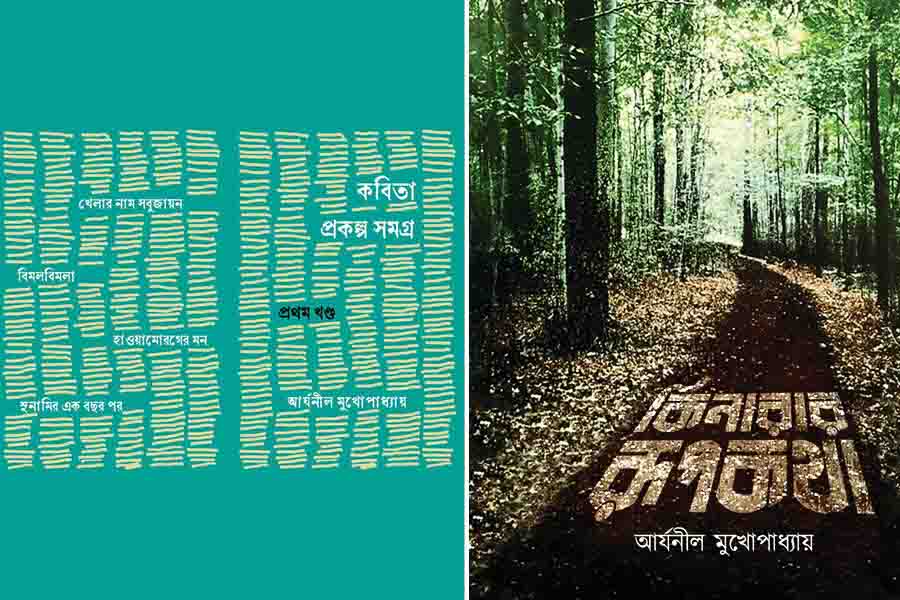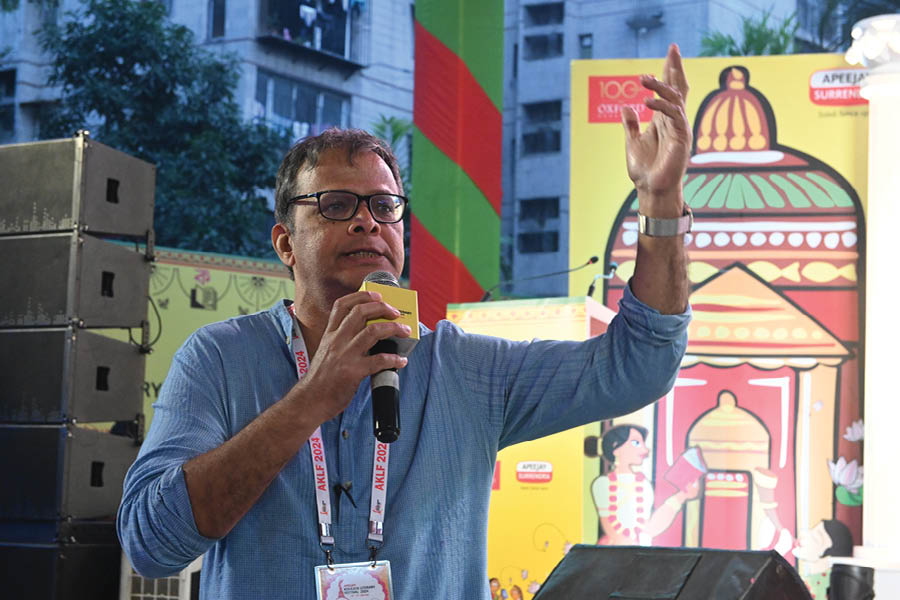Just like parallel cinema, there is parallel literature — a frequently innovative and sometimes obscure alternative to popular, mainstream literature. It is hard enough for a mainstream author to have four publications in a year. For someone writing in the parallel literature paradigm, it is almost unheard of. Then again, Kolkata-born and US-based author Aryanil Mukherjee is no stranger to being a pioneer. Readers of My Kolkata will remember Mukherjee (whose real name is Nilanjan Mukherjee; Aryanil being his pseudonym) as the man who juggles mesh engineering and avant-garde poetry. Having spoken about his life and career at length last year, Mukherjee provides a sneak peek into the four books that have already made 2024 a memorable year for him and his readers.
“I haven’t been writing much over the past one or two years. But, all of a sudden, four publishers approached me and I have four books coming out,” says Mukherjee via video call from his Cincinnati residence. Gentle and methodical, but not without a sharp and warm sense of humour, Mukherjee believes that “parallel literature is getting more attention in India, not least due to the rise in average educational levels as well as the broadening of the middle class”.
He might be happy to have his works on the internet, but Mukherjee makes it a point to write using pen and paper these days, mainly because “I don’t want to lose my handwriting”. While he does not get much time to read novels — “I have only read Gabriel Garcia Marquez and Arundhati Roy’s The God of Small Things in the past two decades” — Mukherjee is a voracious consumer of poetry as well as essays about poetry. Little wonder then that he also edits an online platform called The Mud Proposal, which refers to itself as a “journal-cum-repository of new poetry by innovative authors”.
Accumulating poetry projects and short fiction that is ‘isolationist and existential’

‘Kobita Prokolpo Somogro’ collects poetry from Mukherjee’s first three Bengali books while ‘Kinarar Roopkotha’ includes 21 short stories
Aryanil MukherjeeSpeaking of new poetry, Mukherjee’s first book for 2024 is Kobita Prokolpo Somogro (Collected Poetry Projects), published by Ketab-e. “Since my poetry is project-based, it was hard for me to curate an anthology when the publishers first contacted me for one. Subsequently, the idea became to accumulate four projects from my first three Bengali books. These include Khelar Naam Sabujayan (Greening Game), which deals with environmental consciousness; Bimal Bimala, which focuses on the bonding between two hermaphrodite individuals; Hawamoroger Mon (Weathercock Mind), which experiments by assembling sonnets from disjunctive and fragmented poems; and Tsunamir Ek Bochhor Por (One Year After the Tsunami), which divides into several polysemantic portions,” explains Mukherjee.
Mukherjee’s second book of the year, published by Cafe Table, is Kinarar Roopkatha (Marginal Fables). It is a collection of short fiction that has been extended and enhanced since its first edition in 2005. In it, a total of 21 short stories “ present an isolationist and existential perspective of immigrant life in a faraway land”, according to Mukherjee. Terming marginal people as “neo-existentialist”, Mukherjee says that such individuals can be found in “any strata of society today” and need not only include those “relegated to the undeserved, underprivileged sections”. Five stories from the original edition have been replaced by six new ones, with the fresh additions being “more serious and with more elements of sci-fi and magical realism”.
Cinepoetry and a multi-faceted exploration of time

‘Rupakita’ (right) involves Mukherjee delving into his love for cinema and verse; (left) the proposed cover for ‘Code Memory’
Aryanil Mukherjee“Cinema has been inspiring my poetry unconsciously since the beginning,” reveals Mukherjee before segueing to his third book, Rupakita (Allegorism), published by Joydhak Publications. Mukherjee describes this volume of poems as being “informed and inspired by world cinema in its content, use of allegories and metaphors, as well as form and style”. It is also the book which, surprisingly for Mukherjee (because of its unconventional approach), sold the best of his three books (along with the two aforementioned ones) at the International Kolkata Book Fair earlier this year (all three came out in January 2024). “My poems take from film theory, film philosophy, cinematography, my own brief experience as scenarist, among other things,” narrates Mukherjee, who identifies some of the auteurs whose cinema has shaped his poetry — Yasujiro Ozu, Wim Wenders, Apichatpong Weerasethakul, Carlos Sorin, Adoor Gopalakrishnan, Buddhadeb Dasgupta and Atanu Ghosh.
Mukherjee’s fourth and final book for 2024 is, in his own words, “a multidisciplinary and multi-epistemological exploration of the present understanding of human memory”. “I’ve always been curious about the idea of memory… What is memory to an architect, a historian, an archaeologist, a psychiatrist, a computer scientist and so on?” asks Mukherjee, whose book is called Code Memory (slated for publication in May by Copper Coin), the English counterpart to his Smritilekha (2013) in Bengali, arguably the longest modern Bengali poem. Written in a manner that recalls the stream of consciousness technique made famous by the likes of James Joyce and Virginia Woolf, Code Memory is an evocative intermingling of time, space and experiences and how they interact to build and shape memory.
Despite a prolific year to his name so far, Mukherjee remains characteristically understated. Reluctant to bloviate about his work (unlike most writers), he spends the rest of the video call talking about his routine and friends and enquiring about Kolkata. The conversation ends with an admission from Mukherjee of his default disposition as a writer: “I always gravitate to the poetic form. It happens organically. If there’s an urge to write short fiction, I’d rather weave it into a somewhat new poetic form.”







